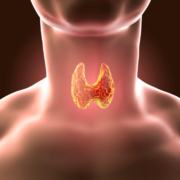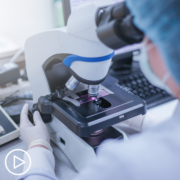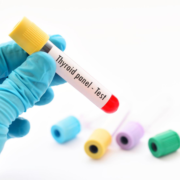What’s the Difference Between Hypothyroidism and Hyperthyroidism?
This article was originally published by the US News on April 19, 2019 here.
The two conditions have similar-sounding names but are actually quite different.
IN THE WORLD OF medicine, many conditions have names that may seem unfamiliar to English speakers. Some of these diseases have names borrowed from other languages, and Greek is a usual suspect when it comes to terms that may not be immediately recognizable to many of us.
This is true for two common medical conditions that have to do with the thyroid gland. The terms hypothyroidism and hyperthyroidism describe two problems that can arise in the thyroid gland – a small, butterfly-shaped structure in the neck that produces hormones that regulate a wide range of bodily functions. At first glance, these words may seem identical. But a tiny change in a couple letters alters the meaning of the two terms substantially, referring to two different conditions.
What Is Hypothyroidism?
In Greek, “‘hypo’ means low or below normal,” says Dr. Joseph Wanski, an endocrinologist with L.A. Care Health Plan in Los Angeles. “Hypothyroidism defines the clinical condition of low or underactive laboratory levels of the thyroid hormone because the thyroid gland does not make enough” of the hormones that the body requires.
These hormones are important because they’re involved with all sorts of bodily functions from how the heart works to how fast your metabolism runs. “The thyroid gland in the neck manufactures a protein called thyroid hormone, which is crucial to the day-to-day function of every cell in the body,” says Dr. John Duncan, pediatric endocrinologist with Health First Medical Group in Melbourne, Florida. “Without it, all chemical functions within the cell slow down.”
Therefore, the term hypothyroidism is used to describe a state of inadequate levels of thyroid hormone, and it “accounts for the majority of issues people experience with their thyroid gland,” says Dr. Brian Jameson, an endocrinologist with Geisinger in Danville, Pennsylvania. “Hypothyroidism is also known as underactive thyroid. In other words, everything in the body slows down. When levels of two key thyroid hormones, thyroxine (T4) and triiodothyronine (T3) are too low in the blood, people experience symptoms.”
Symptoms associated with hypothyroidism include:
- Fatigue.
- Dry skin and hair.
- Brittle nails.
- Slowing of bowels or development of constipation.
- Weight gain.
- Puffy face.
- Muscle cramps.
- Irregular, infrequent or heavier than normal menstrual periods.
- Forgetfulness.
- Depression.
- A hoarse voice.
- Pain, stiffness or swelling of the joints.
- Muscle weakness, aches or stiffness.
If hypothyroidism occurs in a child, it can result in short stature. In teenagers, it may cause an “alteration of pubertal characteristics,” Wanski says. Duncan points out that although being overweight is sometimes blamed on so-called glandular issues, AKA hypothyroidism, “not all individuals with excessive weight will be hypothyroid.”
What Is Hyperthyroidism?
At the other end of the thyroid spectrum is hyperthyroidism, in which the thyroid becomes overactive and generates too much thyroid hormone. “Hyperthyroidism is also known as overactive thyroid,” Jameson says. “In other words, everything in the body speeds up. When levels of two key thyroid hormones, thyroxine (T4) and triiodothyronine (T3) are too high in the blood, people experience symptoms.”
This overstimulation of the thyroid gland results in “a massive surplus of thyroid hormone. This accelerates all the chemical functions and all the cells,” Duncan says. This condition can cause a range of symptoms including:
- Sleeplessness.
- Rapid heart rate.
- Heart failure.
- Weight loss.
- Tremor.
- Bulging eyes or a fullness in the front of the neck.
- More frequent bowel movements.
- Seizures.
- Heart disease.
Hyperthyroidism may also cause “an assortment of other undesirable clinical consequences,” Duncan says.
What Causes Hypothyroidism and Hyperthyroidism?
Duncan says that in most cases, these diseases are caused by “aberrant immunity cell function where white blood cells ‘attack’ the thyroid, which triggers under-function or over-function of the gland. However, there are infants who can be born without a thyroid gland (congenital hypothyroidism)” or the thyroid can be underdeveloped or “located in the wrong place,” Jameson adds. With hyperthyroidism, “there are infants who can inherit the immunity proteins and be born with hyperthyroidism,” Duncan says.
With hypothyroidism, “the most common cause is an autoimmune disease called Hashimoto’s thyroiditis,” Jameson says. “This disease causes the immune system to mistakenly attack a healthy thyroid gland. As a result, the thyroid becomes inflamed and is no longer able to make enough thyroid hormones. It may also become enlarged and develop lumps and bumps known as nodules.” Wanski adds that other causes of hypothyroidism include:
- Radiation to the thyroid.
- Thyroid surgery.
- Damage to the pituitary gland, a pea-sized structure behind the nose at the base of the brain that regulates hormones throughout the body.
- Certain medications.
The National Institute of Diabetes and Digestive and Kidney Disease reports that an autoimmune disorder called “Graves’ disease is the most common cause of hyperthyroidism in the United States. Wanski says other causes of hyperthyroidism include:
- The development of a nodule or lump (or multiple nodules) in the thyroid gland that begins to produce excess hormone.
- Certain medications.
- Viral infections.
Jameson adds that in some cases, thyroid nodules can begin producing hormones when they shouldn’t, a condition called toxic nodular goiter. “Thyroid inflammation, also known as thyroiditis,” may also lead to the development of hyperthyroidism
Who’s Likely to Develop Thyroid Problems?
The American Thyroid Association reports that “more than 12 percent of the U.S. population will develop a thyroid condition during their lifetimes.” And because an “estimated 20 million Americans have some form of thyroid disease,” it may be something you’ll have to deal with at some point.
Although anyone can develop a problem with the thyroid at any age, there are a few risk factors that may make a thyroid issue more likely, including:
- Being female.
- Having recently been pregnant.
- Being 60 or older.
- Having a family history of thyroid or autoimmune disease.
- Having a personal history of thyroid problems or surgery.
- Having an autoimmune disease.
Duncan says problems with the function of the thyroid gland are “far more common in women than men,” ranging from 5 to 8 times more likely to develop in females. “Approximately 5 percent of women will eventually develop a thyroid problem.”
How Are These Conditions Diagnosed?
If hypo- or hyperthyroidism is suspected, your doctor will perform a physical examination and take a thorough medical history. A blood test can determine whether your body’s level of thyroid hormones is in the normal range or too high or too low.
Sometimes, your doctor may find a goiter upon examination. This is the term used to describe an enlarged thyroid, which may be obvious as a lump on the side of your throat. A goiter can be a sign of any issue with the thyroid, including hypo- or hyperthyroidism, cancer or simply a lack of dietary iodine. (Iodine is routinely added to table salt in the U.S. to help ward off this issue.)
If signs of hyperthyroidism are found, your doctor may want to conduct additional tests, including:
- Radioiodine uptake test, in which a small dose of a radioactive iodine is administered and the amount that’s absorbed by the thyroid is measured.
- Thyroid scan, in which a radioactive iodine isotope is injected and a camera creates an image of the thyroid once the isotope has been absorbed.
- Thyroid ultrasound, in which sound waves are used to create an image of the thyroid.
Although your primary care physician may be able to diagnose and manage many thyroid issues, some patients may need to see an endocrinologist – a specialist doctor who focuses on diseases affecting the endocrine system and hormones.
How Are These Conditions Managed?
Both hypo- and hyperthyroidism can be dangerous, and “if left untreated, hypothyroidism can lead to unconsciousness and death,” Wanski says. On the other hand, hyperthyroidism “can cause significant weight loss, infertility, a heart irregularity called atrial fibrillation and double-vision.”
Therefore, it’s important to get appropriate medical care if you have either condition. “If you’re feeling unwell and experience any of the common symptoms of a thyroid problem, talk to your doctor,” Jameson says. “Treatment is relatively simple and can help you get back to feeling like yourself again.”
Depending on which condition you’re dealing with and what’s causing it, you may have a few options for treating it.
“In hypothyroidism, tablets of thyroxine – synthetic thyroid hormone identical to negative thyroid hormone – are administered daily and monitored through blood testing,” Duncan says. These medications restore normal levels of hormones and alleviate many of the symptoms of hypothyroidism.
With hyperthyroidism, the treatment may be somewhat more complicated. “Being multifactorial, hyperthyroidism may require one or more therapies,” Duncan says, but “the goal is to diminish or eliminate the overproduction of thyroid hormone.” Treatment options may include:
- Anti-thyroid medications. These drugs slow the production of excess amounts of hormones.
- Beta-blockers. Although usually used to treat high blood pressure, these medications can treat some of the symptoms of hyperthyroidism including tremor, palpitation and rapid heart rate.
- Radioactive iodine. This approach destroys some or all of the thyroid to stop the overproduction of thyroid hormones.
- Surgery. A thyroidectomy may be undertaken in certain instances to remove most of the thyroid gland and possibly the parathyroid glands, and Jameson says this approach may be a better option for pregnant women or “people who are unable to tolerate other medical treatments.” This approach will necessitate the use of medications for the rest of your life to replace the hormones that can no longer be manufactured within the body.
The most common treatment for hyperthyroidism tends to be radioactive iodine, which is typically administered as an oral pill, and may only require a single dose to be effective. Iodine is an element that is “essential for proper function of the thyroid gland, which uses it to make the thyroid hormone,” the American Thyroid Association reports. The thyroid absorbs iodine, and if it is radioactive, this can shrink or destroy the gland. This therapy is also sometimes used to treat thyroid cancer.
If the treatment destroys the gland or suppresses the thyroid too much, you may develop hypothyroidism as a side effect, but this can be addressed by medications that replace the loss of needed hormones. Hypothyroidism is generally considered easier to treat than hyperthyroidism.
Regardless of which condition you’re being treated for, it’s important to seek appropriate care, especially if you have other medical conditions, as “those may also be adversely affected by the problem until therapy has been introduced,” Wanski says.
The same is true for hyperthyroidism, which can have significant health consequences if it’s not addressed properly. If it’s “left untreated long enough, it can even cause seizures or severe heart disease,” Duncan says.
Jameson adds that “thyroid cancer is also a concern” in people with thyroid problems, particularly those with hypothyroidism. “Thyroid cancer is relatively common, and about three times as many women get thyroid cancer as men. It generally occurs in the nodular goiter of hypothyroidism but can be seen in people whose glands function properly. It’s rare to see thyroid cancer associated with hyperthyroidism.”
Even though it can happen, Jameson says you shouldn’t panic about developing cancer if you’re diagnosed with a thyroid problem. “Thyroid cancer is a very treatable cancer in most instances, usually with surgical removal of all or part of the thyroid and subsequent radioactive iodine tablets to treat the remaining cancer afterward.”










